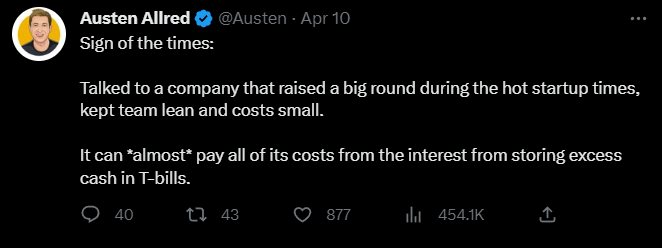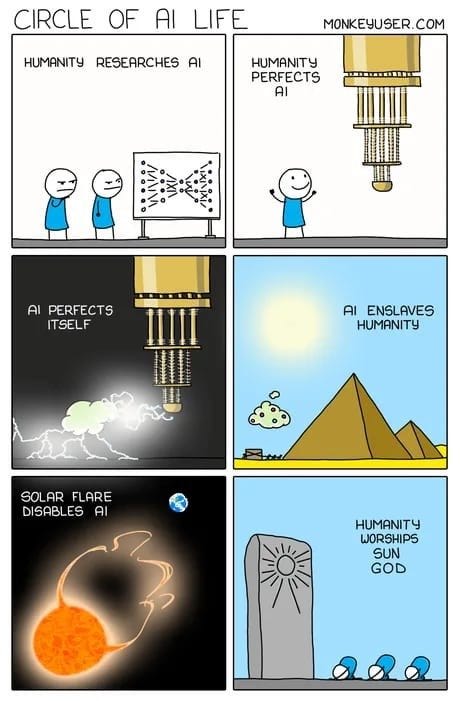M&Ms: Educate Yourself
Some lessons coming up as an immigrant on the 101st edition.
I'll never forget the reaction on the young woman's face at the Office of the Bursar the day I showed up to pay my college tuition.
I pulled out a wad of cash and handed it to her, 15,000 dollars.
I'd counted it. And I made sure all the dollar bills faced the same direction; it takes a little effort, but this little trick makes counting large piles of cash more accurate and easier.
I could tell the young woman at the office had never seen that much cash from a student before.
Her hands were trembling as she counted.
She counted it once, then twice, then she went for it again, three times. And then she called someone else to count it twice too. Back in the early 2000s, this was a lot of money to see in cash.
The second person, an older woman who was the manager at the College Bursar, said, "ok, you're good."
But they both looked at me strangely as I left; they must've thought I earned that money selling drugs or God knows what.
No, I earned that money the hard way. Even though where I grew up in The Bronx, I lost friends to that easy money path; I was lucky enough to stay away from it.
One reason I was able to resist that path is because of my childhood upbringing.
Despite being born poor, I was fortunate that we had good, strong family values back in the third world. I was influenced heavily by aunts, uncles, and grandparents who had grown up poor and yet never strayed into the immoral or unethical.
Then when that path tempted me, I thought, "My parents had me cross oceans and went into debt to have me come here. And who the hell was I to destroy the family name by selling drugs?"
So instead, I earned that money working 35 to 45 hours a week in a restaurant. I put in this work in addition to going to school full-time back then.
Because of school, I put in most of that work in on weekends; I worked doubles—a double is two shifts of 7 hours each, so about 14 hours on Saturday and 14 hours on Sunday. And then, I picked up available shifts on the busy weeknights after the college day ended.
Working 14 hours on a Saturday was brutal, from 10 a.m. to prepare things for lunch until after the dinner shift was over at midnight.
But, to be fair, I made really great money at Enzo's Restaurant. And a lot of those tips were cash.
It was a lot of hours between work and school, but I made enough money that I had some to waste too. Many Saturdays, I worked all day, then I got picked up by my boys, and we hit the clubs and lounges. I went out knowing I would have to work the following day for 14 hours more. Only God knows how I was able to pull this off.
But don't feel bad for me.
I was in my early 20s and didn't want to sacrifice anything.
The first lesson from all this is that if you're starting from a deficit like I was as an immigrant in The Bronx, you might have to work hard and drop 15,000 in cash for a few years to educate yourself.
But it was one of the best investments I made in my life. That Computer Science degree proved to be incredibly valuable for me many years later; it still is valuable. And the restaurant work ethic served me well on the corporate ladder.
And the second lesson is nobody cares about your excuses.
If you want the education, the Bursar's office still wants to get paid to remove the hold from your account. I can confirm they'll take cash, though.
Even a few of my boys didn't care that I was working 14 hours back then. Or that I had work the next morning on Saturday while we were out at the club. It's good they didn't care because they might not have invited me out.
The last lesson is that a good family upbringing can serve you in almost any environment. I am trying hard to create a similar environment for my kids now.
Those early lessons saved me from going down paths that could've ruined my life; that upbringing was also why I believed education was so important. My family was poor, but they were all convinced education was the only way out, and they turned out to be right.
That upbringing even saved me from some of my friends who thought I was a dummy back then. They thought I was a dummy for working that many hours only to hand all that cash to the school when we could've all popped bottles in the club instead.
And to be fair, we did pop some bottles, but not nearly as many as we could have if I didn't have to hand 15,000 to the lady at the Bursar's Office.
Shout out to Christin’s Newsletterwho recently asked me to write more about coming up as an immigrant. You should subscribe to Christin's newsletter; she is awesome.
A short essay from me on wisdom from Benjamin Franklin:
I wrote a piece this week on the Small Bets Newsletter about how Benjamin Franklin made his wealth.
It is not widely known that “Poor Richard’s Almanac” was a huge contributor to how Franklin made his wealth. It enabled him to go on and do many of the other things he is famous for today.
And there is a good lesson in there from Franklin for the rest of us.
“If you would not be forgotten
As soon as you are dead and rotten,
Either write things worth reading, or do things worth the writing.”
– Benjamin Franklin, Poor Richard’s Almanac
Three Tweets: Commerical Realestate, Zombie Startups, Plenty of Fish
Commercial realestate is in a lot of trouble.
Interest rates going up significantly hurts commercial real estate, which is usually bought on variable, non-fixed loans.
But add to this the fact that Remote Work is now the dominant way of working rather than the Office, and we have a double whammy of forces acting on an industry trying to recover from covid at the same time.
A disaster in the making. But every disaster brings with it new opportunities.
Another crazy sign of the times is firms that can cover themselves on just interest rates.
My favorite part about this story is that Markus built Plenty of Fish, a dating site that made him $575m using AspDotNet.
There are some good lessons from Markus in there about how creating a low-cost or free service when everyone is ripping people off is a huge advantage if you can pull it off.
Plenty of Fish was free, and everyone else was charging.
Three Memes: The Circle of AI Life, Italy does not play, Be yourself
Now it all makes sense.
The Italians don’t seem to mess around when it comes to tech.
The importance of being yourself on the internet rather than faking it.
As always, thank you for reading.
-Louie
P.S. You can reply to this email; it will get to me, and I will read it even if I can’t always reply in a timely manner.











Thank you for the shoutout Louie! As a a neuroscience PhD, former biotech marketing leader, and a Buddhist chaplain-in-training, my newsletter helps fellow overthinkers practice *actionable* mindfulness to spark epiphanies and build better relationships.
I'm not surprised at all by how hard you worked (and continue to work!) I'm wondering how you instill the same values in your children when they are not living under as hard circumstances? Perhaps a future issue :)
> The last lesson is that a good family upbringing can serve you in almost any environment. I am trying hard to create a similar environment for my kids now.
I often hear this sentiment from parents, but I'm not a parent though I'd like to be some day, and I'm interested in your take...
What are some of the things you do (and don't do) to create that similar environment for your kids?
Because I imagine it might not be so easy. I know parents who say, "I don't want my kids to suffer the way I had to suffer." And then there are those on the other end who say, I'm not doing *anything* for them; they'll just have to figure out life for themselves.